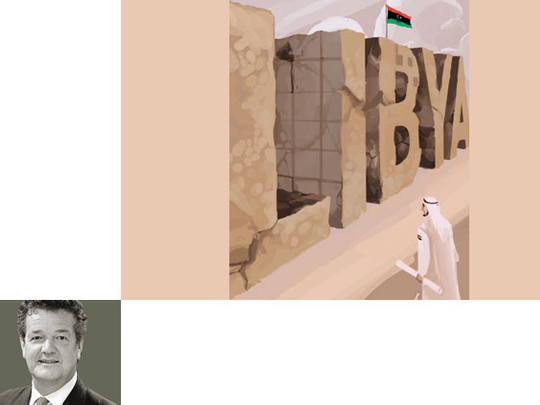
Rebuilding a country like Libya is a huge task, which has only just begun. The excitement of revolution and successful change of government is only the first step in a very long process, and the new or interim governments in those Arab states which have succeeded in their Arab Spring are actively looking for help.
The formidable soft power of the UAE was on display this week in Libya when Etihad Airways' inaugural flight from Abu Dhabi to Tripoli was accompanied by a large delegation of government officials and businessmen.
As Dr Anwar Mohammad Gargash, Minister of State for Foreign Affairs, told me in Tripoli, "Libya needs many things, and the UAE has specific skills to offer. We have many successful areas of administration and how we do things, which are very compatible with an Arab and Muslim country like Libya. I think there can be a lot of cooperation in these areas".
In addition to ministry officials ready to talk to their counterparts in Libya, the UAE delegation also included a wide range of skills, such as people from institutions like Dubai Autism Centre, who were due to meet the Libyan Ministry of Social Affairs to describe how they operate, and offer advice and support.
There were also many large UAE companies in the delegation which were looking for commercial opportunities, but in addition to their obvious need to make money, the wider social and political impact of these activities was welcomed by the Libyans.
Opportunities
One Libyan official at the official welcome spoke of the high importance of creating new jobs in Libya, both as opportunities for people to have work in a country that is sadly lacking good jobs, but also as an opportunity to bring modern business skills and technology into the country.
Maybe part of the warm welcome given to the UAE delegation was due to the UAE's role in supporting the revolution, but neither the minister nor many of the delegation wanted to trade on that.
One company spoke of working on a purely commercial basis, and emphasised the necessity of establishing a presence in the country as quickly as possible, not so much to deal with Libya's problems (which is the Libyan priority) but so as to beat the global competition which the UAE companies know will be coming.
Unemployment in Libya is very high given the dislocation caused by the year-long war to remove Muammar Gaddafi, but the lack of serious investment in the country for decades has had a terrible impact on the people, with a dearth of productive work available.
A short drive though Tripoli revealed a depressed city, with very few modern buildings and a lot of entrenched neglect built up over the years, which was hard to distinguish from any recent war damage. The obvious exception was Gaddafi's former residential compound in Bab Al Aziziya — which has been demolished leaving large heaps of concrete piled up — where the former dictator used to run the country.
The drab concrete and piles of rubbish, the tattered buildings and uneven roads all pointed to the huge scale of the task. The more daring entrepreneurs in the UAE delegation agreed on the huge size of the task, but pointed out that this also means huge opportunities for those companies that can help make the improvements happen.
But an even more complicated job is the unseen task of building new institutions in a country that has been run by an individual dictator for four decades, who has left no legacy of institutional culture. Everything has to start from scratch.
The confidence of the Libyans and the readiness of the UAE to help were important examples of two Arab countries building new links and finding ways to mutually benefit. The obvious benefit of sharing a language was only a start, along with the shared Arab and Muslim identities that Dr Gargash referred to.
This kind of mixed government and private sector activity is where the UAE is good at making things work. For example, ministry officials from both sides were ready to discuss the need for a bilateral trade agreement, so that the legal side of doing business would become easier.
The almost humdrum style of working was a dramatic change from the drama of last year's military intervention and liberation struggle. But it is all the more encouraging for that. It is necessary that the entrepreneurial work being done in Libya this week is miles away from the horror of military action.
It gives people hope that jobs can be created, that they can rebuild their lives and start to save and see their children through school, and young men and women can start to learn the key skills that will see them into a productive working life.
It is valuable to compare what is happening in Libya with events in Syria. Regional frustration at the lack of any progress in Syria is leading to talk of military intervention, with all the consequent dislocation and confusion. The long-term future is visible in what is happening in Libya, where the requirements for skills and opportunities is being planned.










